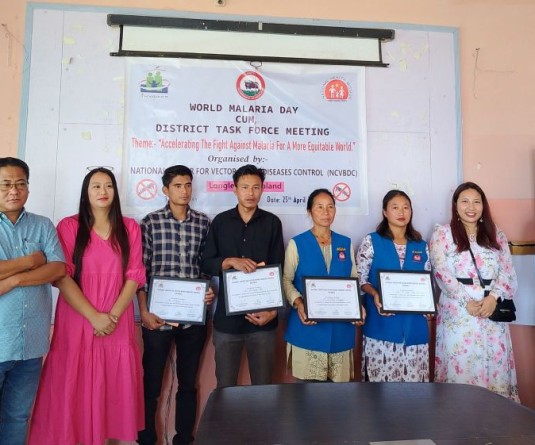
• Set to emerge as major coffee producer in India
• Export of coffee increased to 2400 kilo this year
Morung Express News
Kohima | August 5
Nagaland may soon emerge as a major organic coffee producer in India with the Government of Nagaland’s plan to bring 50,000 Ha areas under coffee plantation by 2027 as part of its Vision 2030 program.
Y. Kikheto Sema, Secretary, Land Resources Department on August 5 pointed out that the coffee production has increased over the years in Nagaland. In the initial stage, only 600-700 kg of coffee was exported, however, this year it increased to 2400 kg. By next year, the department hopes to export 4200 kg.
Under the brand Nagaland Coffee, the coffee produced in Nagaland is already being exported to South Africa, and plans to export to Germany and the US are also in the pipeline.
On August 5, Chief Secretary Pankaj Kumar, officials from the Coffee Board of India and LRD paid a visit to coffee plantation areas in Nerhema, Tsiesema and Kohima Village, where the viability of coffee production in Nagaland was discussed at length.
Hoto Yeptho, Director of Land Resources Department mentioned that Nagaland coffee is considered to be one of the best coffees in the world. Yeptho informed that an expert in coffee tasting who came to Nagaland considered the coffee produced in Nagaland as one of the best after tasting the flavors of coffee grown in different areas in the State.
Coffee which is best grown in mountainous regions and shaded areas holds potentials for Nagaland. While acknowledging the efforts and contribution of the LRD to the farming community, former NAPO President Vilieo Rutsa also expressed apprehension on the marketing of the production sharing about past experiences. In the 1980s, the first introduction to coffee plantation failed, it was pointed out.
In view of the decrease in farming population in Nagaland, Rutsa also cited the decrease in organic farming where many urban dwellers today usually consume vegetables sprayed with chemicals. “There is a lot of satisfaction in growing our own products organically. It also saves us a lot of money, while also providing health benefits,” said Rutsa.
With the Department providing necessary assistance and extra efforts to make sure that coffee production increase, Rutsa hoped that the project will alleviate poverty and help uplift the Naga villages and society.
Sharing the history of coffee in India around 1600-1800, Coffee Board of India (CBI) Extension, Guwahati Joint Director, Dr. V.R Gudde Gowda also pointed out the benefits of coffee which stimulates and rejuvenates one suffering from stress.
“Coffee is a shade-loving plant and provides economic stability. We believe that coffee will flourish in North East states,” said Gowda, however, pointing out the problem of marketing. Gowda also encouraged the plantation of other crops and vegetables alongside coffee for economic sustainability.
According to Gowda, Nagaland is one of the first states in North East which came forward for the growth of coffee and is growing in the world map of coffee lovers. “Coffee is also important because it protects your forest, and conserves water. Because of the default organic nature in Nagaland, coffee has a huge scope. We will see that Nagaland coffee gets recognition among coffee drinkers in the world. We will work out and do our best,” assured Gowda. By planting coffee, Gowda also pointed out that “we are indirectly conserving and giving back to the next generation.”
Last year when the Nagaland coffee was introduced during the Hornbill Festival, good reviews were received from tourists, said Sema, mentioning that Nagaland coffee is being sold at the same rate as other coffee across the world.




.jpg)